The Samsung 990 EVO Plus SSD is the latest addition to the company’s well-known consumer lineup, packed with speed, power efficiency, and storage capacity enhancements. Building on the Samsung 990 EVO, it incorporates Samsung’s 8th-generation V-NAND and a 5nm in-house controller to boost both sequential and random read/write speeds while also offering better heat management and a more efficient power profile. For those needing larger storage capacities, the 990 EVO Plus offers configurations up to 4TB, providing ample space for demanding users.
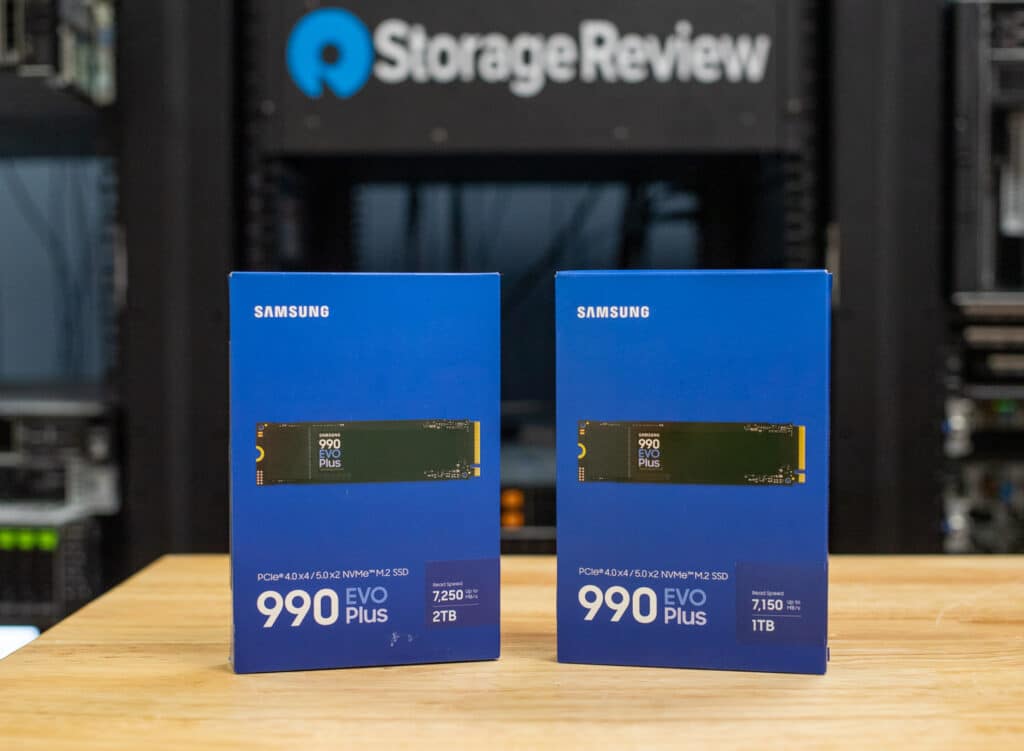
Performance Profile: Samsung 990 EVO Plus vs 990 EVO
Samsung claims the 990 EVO Plus offers a significant performance leap over its predecessor, so let’s take a closer look at the numbers. Starting with sequential read speeds, the 990 EVO Plus is rated at up to 7,250 MB/s for the 2TB and 4TB models—a 45% increase over the 990 EVO’s 5,000 MB/s. This means faster load times and smoother handling of large files. Sequential write speeds also see a boost, with the 990 EVO Plus hitting up to 6,300 MB/s compared to the 990 EVO’s 4,200 MB/s, marking a 50% improvement in writing performance.
Regarding random read performance (4 KB, QD32), the 990 EVO Plus 2TB model reaches up to 1,000,000 IOPS, a 43% gain over the 990 EVO’s 700,000 IOPS. This translates into quicker access times and a smoother multitasking experience, especially when handling multiple files or applications simultaneously. The 4TB model pushes these numbers even higher, achieving up to 1,050,000 IOPS, nearly 50% faster than the previous model’s best.
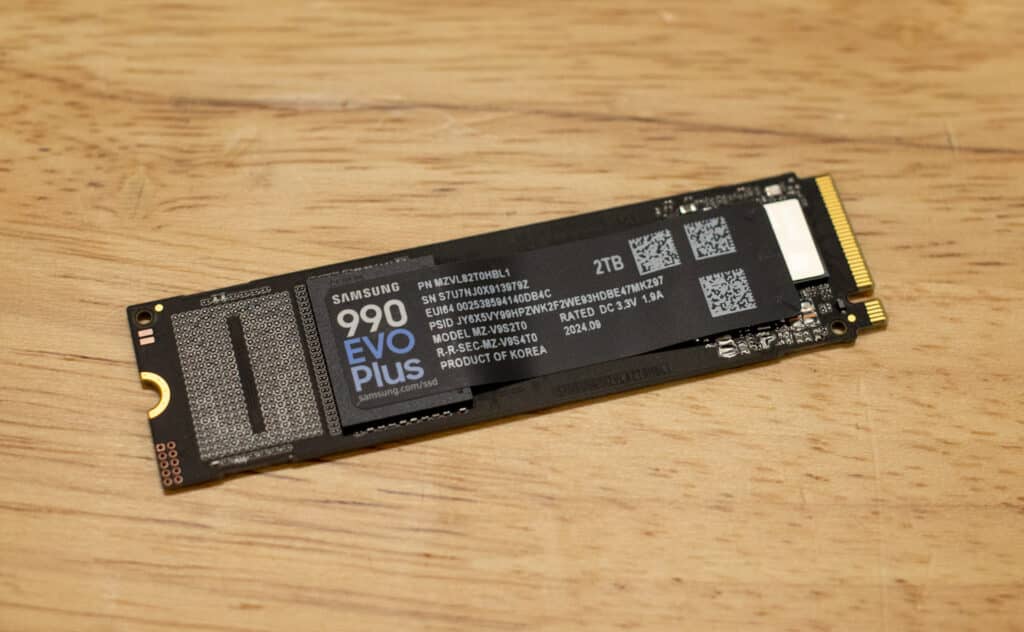
Random write performance also sees a substantial boost. The 990 EVO Plus delivers up to 1,350,000 IOPS for 1TB and 2TB models, with the 4TB model topping out at 1,400,000 IOPS. The standard 990 EVO peaks at 800,000 IOPS across all capacities. This 69% improvement in random write performance means users can expect faster write speeds during frequent write-heavy operations.
The 990 EVO Plus can (potentially) achieve all of this without a DRAM module, thanks to Samsung’s Host Memory Buffer (HMB) technology. This feature provides low-latency access across demanding tasks, such as gaming, content creation, and operating systems, with frequent data access, giving the drive a clear edge in multitasking environments. That said, real-world performance results can differ from these specifications, as we will discuss in the detailed tests below.
Samsung 990 EVO Plus Power Efficiency
Samsung has also equipped the 990 EVO Plus with advanced power and thermal management technologies to help maintain high performance over extended periods. The drive features a nickel-coated controller and a heat spreader label that effectively dissipates heat, preventing the device from reaching critical temperatures during intensive tasks. As shown in Samsung’s DTG test below, when operating at 25°C during sequential write operations, the 990 EVO Plus could avoid triggering its Dynamic Thermal Guard (DTG) technology entirely, meaning users can expect consistent performance without thermal throttling.
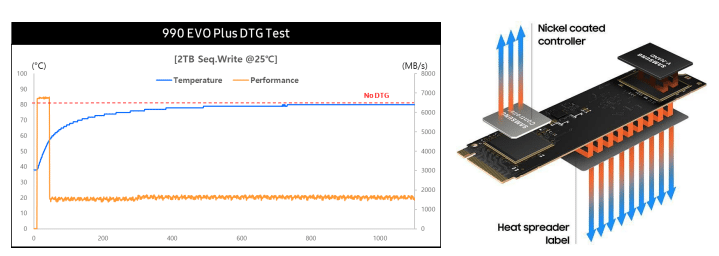
Samsung claims that this combination (along with the new 5nm controller) will result in a 73% improvement in MB/s per watt compared to the 990 EVO. This is especially beneficial for portable setups or systems with limited cooling capabilities.
Samsung 990 EVO Plus Other Features
Samsung’s TurboWrite 2.0 technology dynamically allocates write speeds to maintain consistent performance as the drive reaches higher capacities. This feature is useful for professionals handling large files or continuously capturing data. It helps avoid performance dips and ensures smooth operation when working on resource-heavy projects.
Additionally, the 990 EVO Plus supports Samsung’s Magician software suite, which is easily the best SSD tool kit out there. The comprehensive software provides features like health monitoring, data migration, and encryption options, making it easier for users to manage their drives while ensuring data security. It does this all via a very modern, well-designed interface. Additionally, the suite’s support for AES 256-bit encryption and other security protocols is valuable for professional and creative users who must safeguard sensitive data.
Backed by a 5-year warranty, we will look at the 2TB model for this review.
| Samsung 990 EVO Plus SSD Specifications | |
| Form Factor | M.2 (2280) |
| Interface | PCIe 4.0 x4 / 5.0 x2 NVMe 2.0 |
| Capacity Options | 1TB, 2TB, 4TB |
| Sequential Read Speed | Up to 7,250 MB/s |
| Sequential Write Speed | Up to 6,300 MB/s |
| Random Read Speed (4KB, QD32) | 1TB: Up to 850,000 IOPS 2TB: Up to 1,000,000 IOPS 4TB: Up to 1,050,000 IOPS |
| Random Write Speed (4KB, QD32) | 1TB: Up to 1,350,000 IOPS 2TB: Up to 1,350,000 IOPS 4TB: Up to 1,400,000 IOPS |
| Power Consumption (Active) | 1TB: 4.3W (Read), 4.2W (Write) 2TB: 4.6W (Read), 4.2W (Write) 4TB: 5.5W (Read), 4.8W (Write) |
| Power Consumption (Idle) | Typical 60 mW |
| Power Consumption (Sleep) | Typical 5 mW |
| Operating Temperature | 0 – 70°C |
| Shock Resistance | 1,500 G & 0.5 ms (Half sine) |
| Storage Memory | Samsung V-NAND TLC |
| Controller | Samsung In-House Controller (5nm) |
| Cache Memory | Host Memory Buffer (HMB) |
| Encryption | AES 256-bit Encryption (Class 0), TCG/Opal, IEEE 1667 |
| Reliability (MTBF) | 1.5 Million Hours |
| Warranty | 5-year Limited Warranty 1TB: 600 TBW 2TB: 1,200 TBW 4TB: 2,400 TBW |
Samsung 990 EVO Plus Performance
We will compare the Samsung 990 EVO Plus against a few other recent consumer SSDs in our performance benchmarks.
For testing, we use two platforms. The consumer test platform supports PCIe Gen4/Gen5 SSDs and runs Windows 11. It is leveraged for lighter consumer-based tests such as BlackMagic DiskSpeed Test, CrystalDiskMark, and our primary platform, a Dell PowerEdge R760, which overlaps our enterprise tests. Serial Cables supplied an 8-bay PCIe Gen5 JBOF for testing for U.2/U.3, M.2, and E1.S/E3.S drives. This allows us to test all current and emerging drive types on the same test hardware. With the lack of onboard DRAM with the Samsung 990 EVO Plus, our enterprise platform used for vdbench tests will generally see slower performance than the drive inside our consumer platform running Windows 11.
Dell PowerEdge R760 Configuration
- Dual Intel Xeon Gold 6430 (32 cores/64 threads, 1.9GHz base)
- 1TB DDR5 RAM
- Ubuntu 22.04
VDBench Workload Analysis
The VDBench Workload Analysis tests are a set of synthetic workloads that help provide baseline, repeatable conditions across multiple drives. These tests fill the drive surface with data and then partition a drive section equal to one percent of the drive capacity to simulate how the drive may respond to application workloads. This differs from full entropy tests, which utilize 100% of the drive and take it to a steady state.
We will look at seven different tests, including:
- 4K Random Read: 100% Read, 128 threads, 0-120% iorate
- 4K Random Write: 100% Write, 64 threads, 0-120% iorate
- 64K Sequential Read: 100% Read, 16 threads, 0-120% iorate
- 64K Sequential Write: 100% Write, 8 threads, 0-120% iorate
- VDI Boot
- VDI Initial Login
- VDI Monday Login
Starting with the Random Read 4K test, the Samsung 990 EVO Plus peaked at 266K IOPS with 480ms latency, outperforming the EVO and WD Blue SN580 drives. However, it still lagged well behind the higher-end Samsung 990 Pro and Crucial T500.
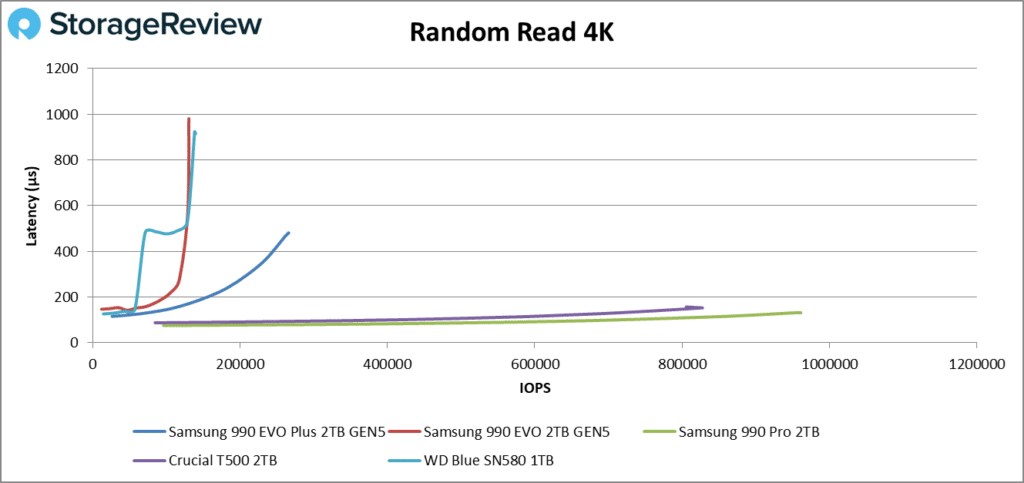
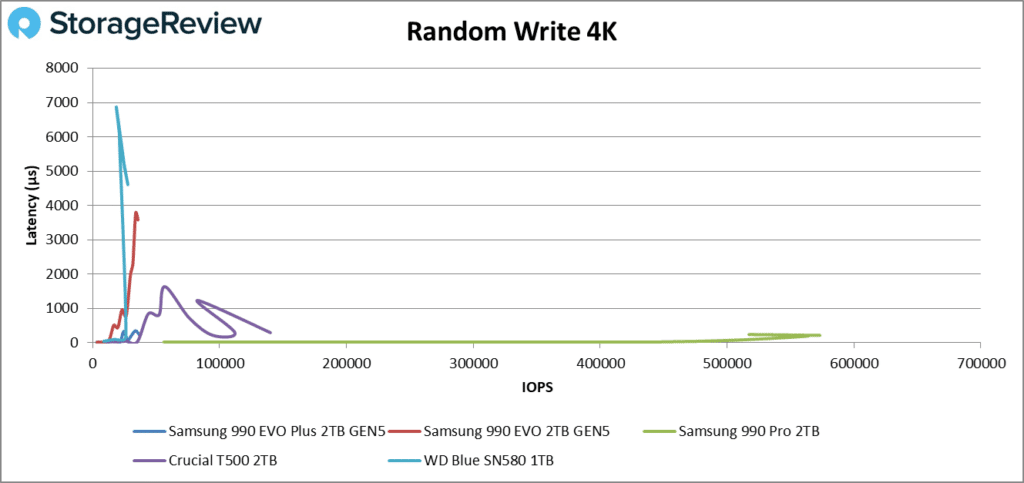
The EVO Plus struggled for the Sequential Read 64K test, falling behind the rest of the drives. It reached only 1.56GB/s at 1,277.3ms, while even the non-plus 990 EVO doubled that speed with 3.22GB/s.
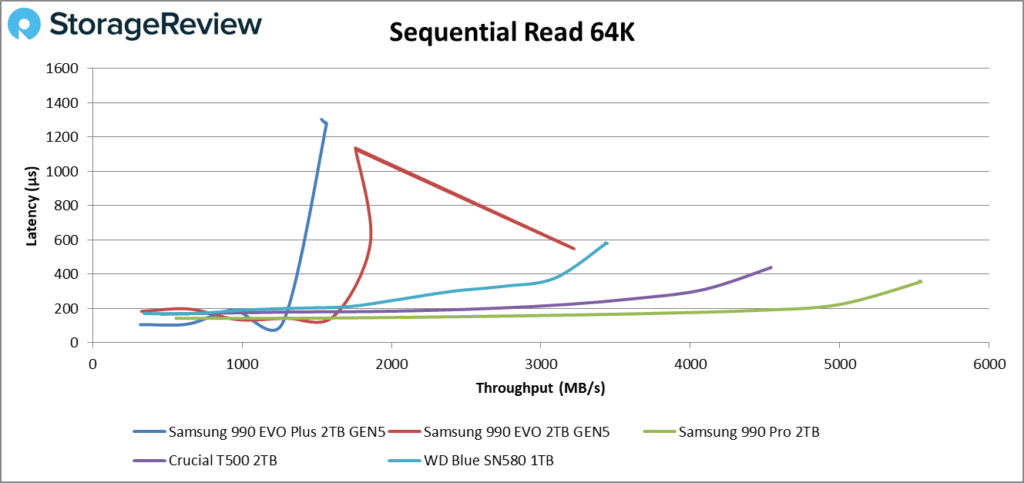
In the Sequential Write 64K test, the Samsung 990 EVO Plus performed better. It peaked at 586MB/s with a latency of 1,664.2ms, a noticeable improvement over its predecessor.
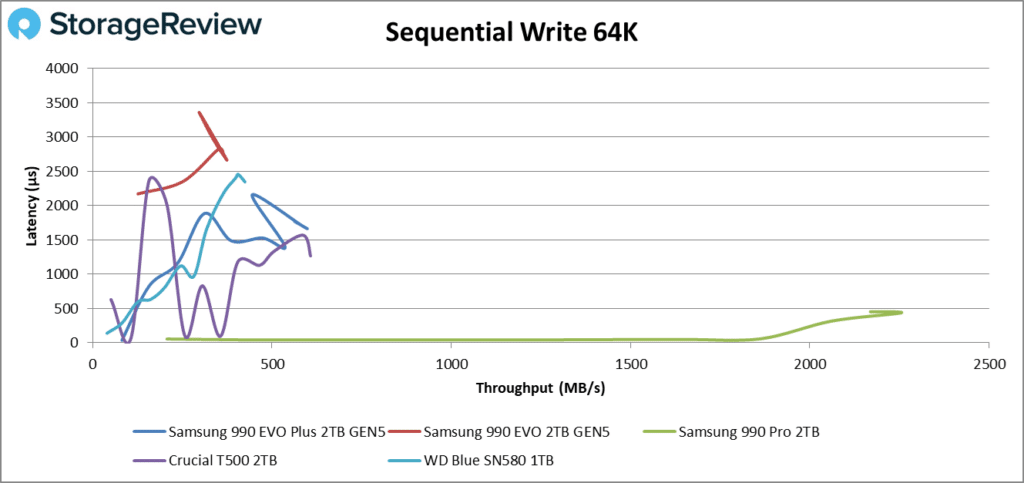
In the VDI Boot test, the Samsung 990 EVO Plus topped 42K IOPS with a latency of 829ms, outperforming the regular 990 EVO, which maxed out around 35K IOPS at 922ms and finished with over 1,000ms latency. As expected, the Crucial T500 and 990 Pro were significantly ahead in this category.
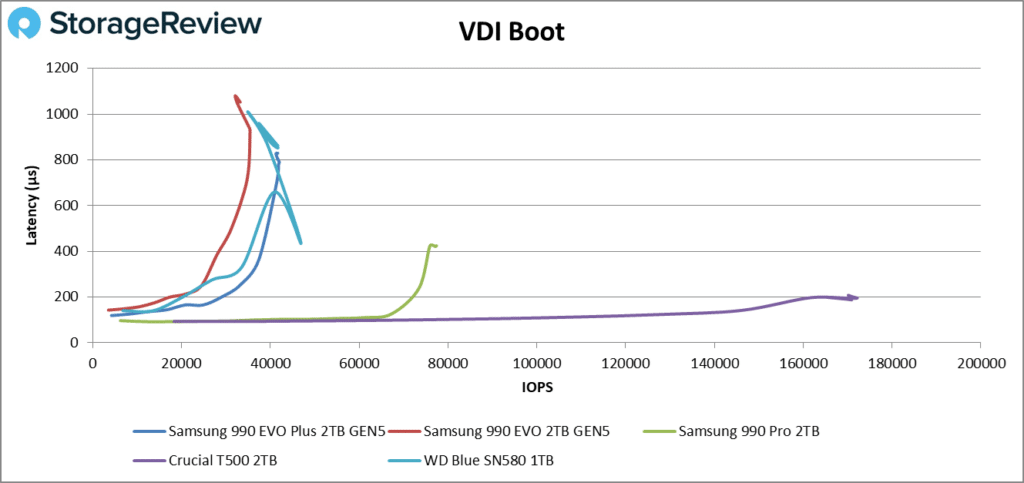
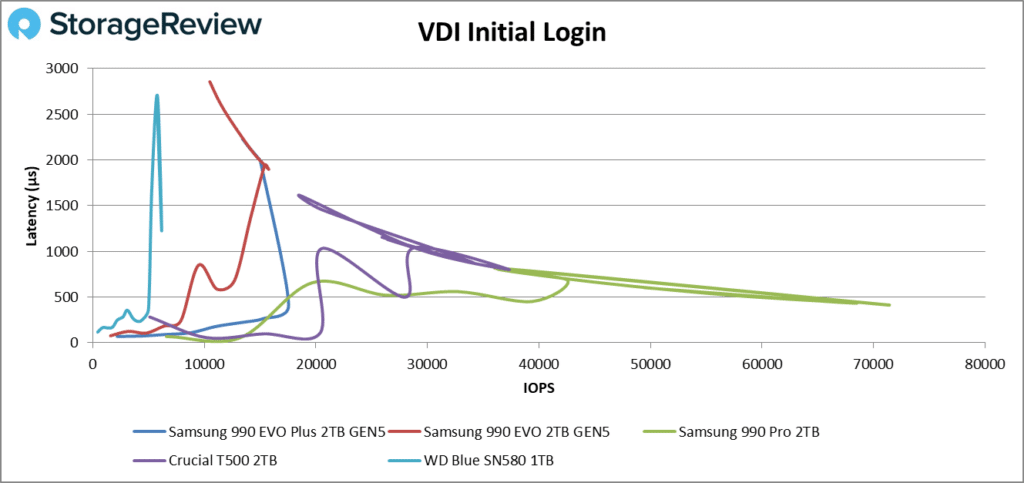
For the VDI Monday Login, the Samsung 990 EVO Plus did quite well for its price range, hitting 16K IOPS with 978.5ms latency. This was a clear improvement from the non-plus 990 EVO, which only reached 11K IOPS at 1,450ms latency.
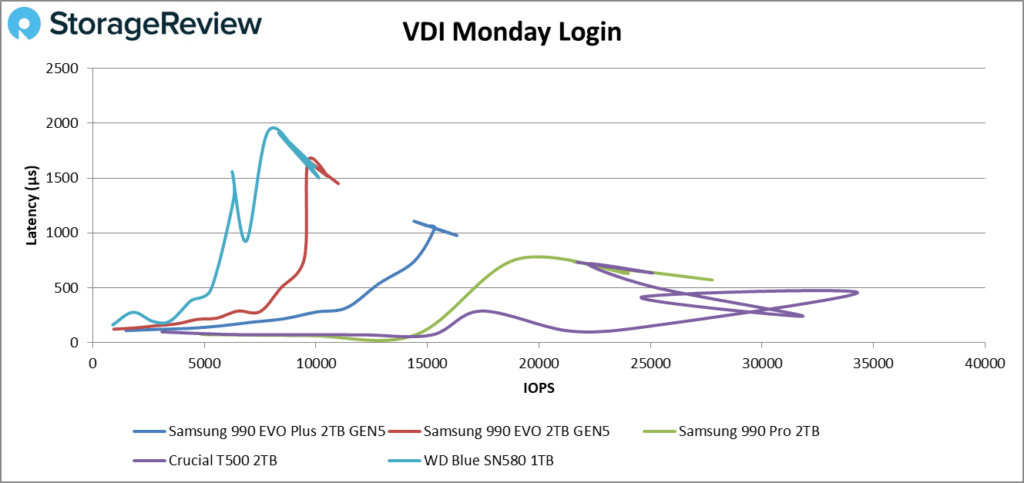
BootBench
BOOT-BENCH-1 is an OCP workload profile designed to test SSDs for server boot duty. While this role is typically for enterprise SSDs, client SSDs are often chosen for their balance of performance, capacity, and cost. This is particularly relevant for hyperscalers and system providers facing similar challenges.
Before running a read-heavy workload, the boot test fills the entire drive with writes. It involves a 32K random read async operation, a 15MiB/s synchronous 128K random write, and a 5MiB/s synchronous 128K random write/trim in the background. Starting at four jobs, it scales up to 256 during peak read operations.
Unfortunately, like the standard version of the 990 EVO, the Samsung 990 EVO Plus failed the bootbench.
| SSD | Read IOPS |
| Sk hynix Platinum P41 | 220,884 IOPS |
| WD SN850X | 219,883 IOPS |
| Solidigm P44 Pro | 211,999 IOPS |
| Fantom VENOM8 | 190,573 IOPS |
| Samsung 990 Pro | 176,677 IOPS |
| Sabrent Rocket 4 Plus | 162,230 IOPS |
| ADATA Legend 970 (Gen5) | 65,632 IOPS |
| Corsair MP700 Pro (Gen5) | 51,521 IOPS |
| Predator Storage GM7 | 35,302 IOPS |
| Samsung 990 EVO Plus | DNF |
| Samsung 990 EVO | DNF |
CrystalDiskMark Speed Test
CrystalDiskMark is a popular drive benchmark. We tested the Samsung 990 EVO Plus inside our consumer test platform running Windows 11, using five passes with a 32GB sample file. Here, it was able to hit 7.14GB/s read and 5.76GB/s write.
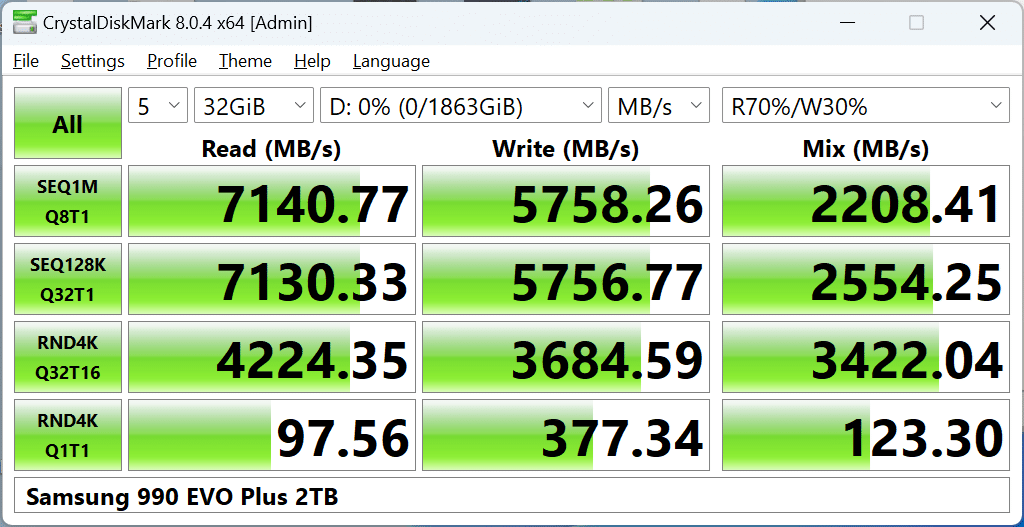
This is a noticeable bump in speed over the standard Samsung 990 EVO model, which reached 5.01GB/s read and 3.75GB/s write in our review.
Blackmagic DiskSpeed Test
Lastly, we tested performance within a Windows 11 environment using the popular Blackmagic tool. The Samsung 990 EVO Plus achieved 5.47GB/s read and 4.88GB/s write speeds. This represents a solid improvement over the non-plus version, which managed only 4.26GB/s read and 3.44GB/s write, marking a 28% increase in read speed and a 42% boost in write performance.
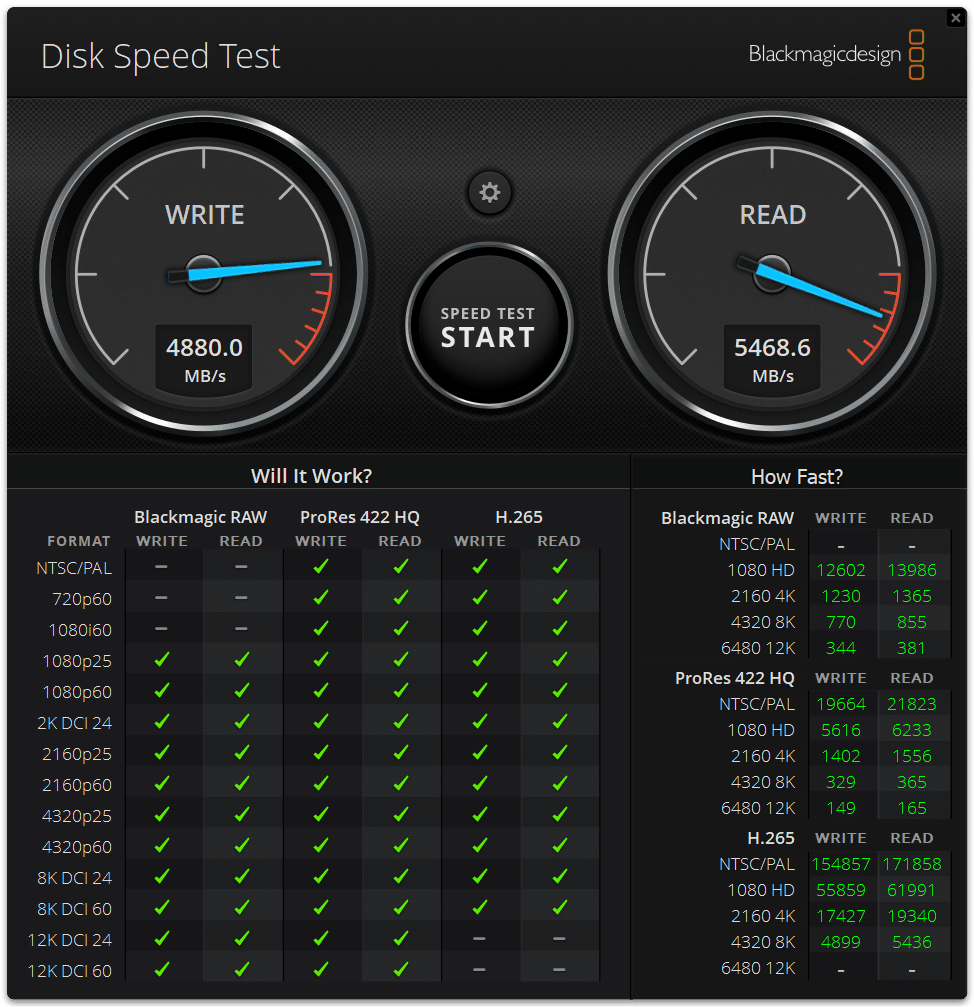
While these gains are impressive, they fall short of Samsung’s claims. The 990 EVO Plus is specced to deliver up to 7,250MB/s read speeds for the 2TB and 4TB models—a 45% improvement over the 990 EVO’s 5GB/s. Similarly, the Plus version promises write speeds of up to 6,300MB/s, a 50% increase over the 990 EVO’s 4,200MB/s. While the real-world performance doesn’t quite reach these numbers, the upgrade still offers faster load times and smoother handling of large files.
Conclusion
The Samsung 990 EVO Plus is a solid choice for those looking to upgrade their storage, especially if you need something that balances performance, power efficiency, and capacity. With its enhanced speed over the standard 990 EVO and features like Samsung’s 8th-gen V-NAND and a 5nm in-house controller, the EVO Plus is a good fit for consumers who need reliable storage for gaming, content creation, and everyday computing tasks. Its extensive capacity options (up to 4TB) make it appealing for users handling large amounts of data or working with resource-heavy applications.
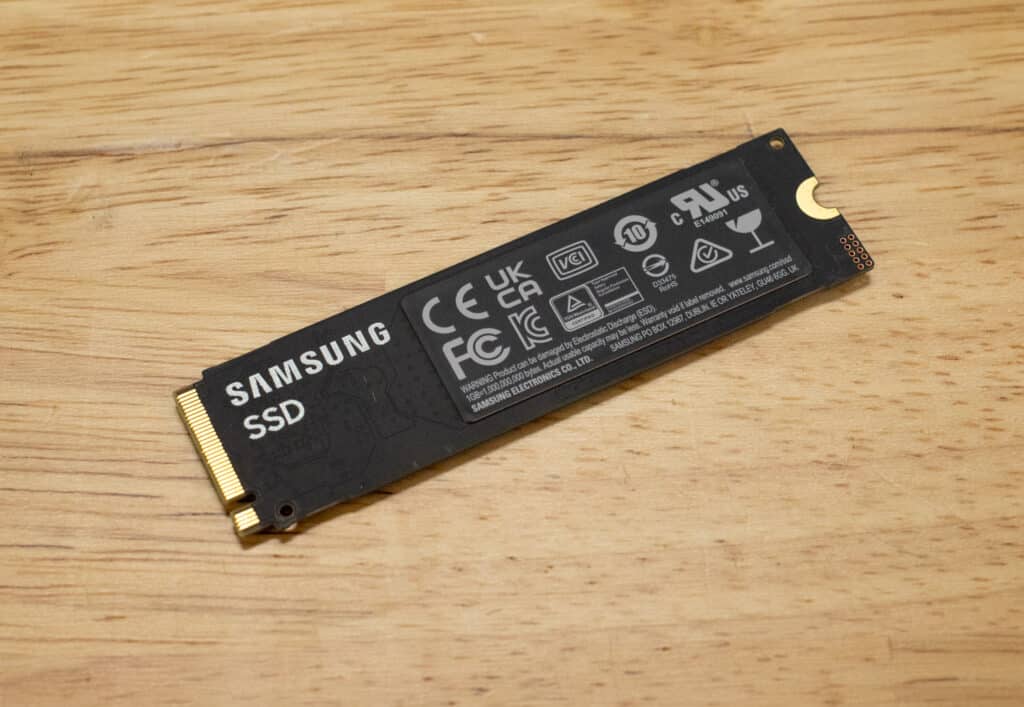
In terms of performance, the 990 EVO Plus shows clear improvements over its predecessor, particularly in random read and write speeds, although its sequential read performance leaves something to be desired. While the drive delivers solid real-world results, it doesn’t always meet the figures claimed by Samsung. For instance, in our BlackMagic test, the EVO Plus achieved 5.47GB/s read and 4.88GB/s write—respectable but still falling short of the promised maximums. Most users will still experience a noticeable and worthwhile performance boost, especially in everyday tasks and multitasking.
Regarding pricing, the 990 EVO Plus sits at the higher end of the budget-friendly SSD market, carrying a bit of a premium for its performance and features. The 1TB model is currently on sale for $90, with the 2TB version at $150 and the 4TB version at $345. This places it higher than alternatives like the Western Digital Blue SN580, which starts at $75 for 1TB and $260 for 4TB (though it often fell well behind the 990 EVO Plus in our tests). Meanwhile, Samsung’s 990 Pro offers significantly better performance and isn’t priced much higher—$109 for 1TB and $309 for 4TB when on sale. The Pro series is undoubtedly the better option for those focused purely on performance at this price point. Still, the EVO Plus remains a compelling choice for those looking to balance performance and price, especially if high capacity is a priority.
Ultimately, the Samsung 990 EVO Plus offers solid speed and reliability, making it a strong option for diverse users. Its power efficiency and advanced thermal management also ensure it can handle heavy workloads without sacrificing stability. However, considering the price, those who need the absolute best performance for their money might want to consider the 990 Pro. But if you’re looking for solid all-around performance with high-capacity options, the 990 EVO Plus is a solid addition to Samsung’s consumer SSD lineup.
Samsung 990 EVO Plus at Amazon (Affiliate link)




 Amazon
Amazon